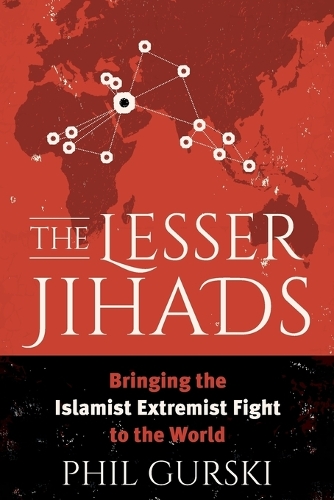
The Lesser Jihads: Bringing the Islamist Extremist Fight to the World
(Paperback)
Available Formats
Publishing Details
The Lesser Jihads: Bringing the Islamist Extremist Fight to the World
By (Author) Phil Gurski
Bloomsbury Publishing PLC
Rowman & Littlefield Publishers
25th August 2017
United States
Classifications
Tertiary Education
Non Fiction
Terrorism, armed struggle
363.32508829
Physical Properties
Paperback
214
Width 149mm, Height 230mm, Spine 16mm
322g
Description
The Lesser Jihads examines conflict through the lens of Islamist terrorist groups. It outlines how terrorists see war, as well as what historical and current events and ideas they use not only to justify violence, but also encourage others to participate. Following a brief examination of recent wars in which Islamist terrorist groups played a significant role (Afghanistan, Somalia, Bosnia, Iraq, and Syria), the text describes ongoing conflict in 22 countries across Asia, Africa, and Europe. It shows how Jihadists use their propaganda to continue what they see as their obligation to fight to protect Islam, and how extremist messaging interprets these conflicts. It identifies and explains the connectivity of these conflicts, framing them into a global world view. In light of the ongoing war in Syria, the text provides a timely warning that other wars may grow in lethality and scope, arguing that there is enough Muslim suffering and perceived international aggression against Islam to feed future conflict. Bringing together in one volume different conflicts where terrorist groups are active worldwide, it introduces the world and thinking of Jihadists while highlighting a number of seldom reported cases.
Reviews
Gurski, a former Canadian intelligence analyst, provides an excellent survey of armed conflicts involving what he refers to as lesser jihads, or the most extreme and intolerant Islamic terrorists who view the world as a zero-sum game. Chapters are organized by region as Gurski walks the reader through cases where Muslims are at times the aggressors, but also frequently the victims. Through brief case discussions, he demonstrates that regardless of local and underlying causes, violence against Muslims anywhere has been presented by Islamic terrorists via social media as a worldwide offensive against traditional Islam, or what he terms the ummahfication of war. External actors feed into this narrative through foreign military intervention in some cases and through neglect in others, helping to explain the transnational migration of foreign fighters. Gurksi concludes with valuable lessons and suggested approaches by external actors to make the ummahfication of war narrative less effective. Readers will find the book interesting and insightful.
Summing Up: Highly recommended. Upper-division undergraduates through professionals.
Jihadism is complicated. Very few are qualified to explain the complexity of phenomenon in the lucid and incisive manner as we find in Phil Gurskis new book. Benefiting from his background in both academia and intelligence analysis, Gurski has written a well-informed and nuanced tour d'horizon of the conflicts and chains of events that brought about, and continue to fuel, Al Qaedas and Islamic States terrorist activities. It should be read by students and scholars in the fields of armed conflict, political violence and Islamist militancy. I would also recommend it for practitioners involved in preventing, countering and analyzing violent extremism -- Petter Nesser, senior researcher with the Norwegian Defence Research Establishment (FFI)
The Lesser JiThe Lesser Jihads provides an accessible summary of jihadist ideology and thinking across a number of conflicts. Gurskis discussion of the Uighurs is a particularly welcome contribution. This work serves as an important reminder that many countries outside of Syria and Iraq have been and continue to be affected by the current wave of terrorist violence, and that Muslims are disproportionately affected by that violence.
hads provides an accessible summary of jihadist ideology and thinking across a number of conflicts. Gurskis discussion of the Uighurs is a particularly welcome contribution. This work serves as an important reminder that many countries outside of Syria and Iraq have been and continue to be affected by the current wave of terrorist violence, and that Muslims are disproportionately affected by that violence.
A valuable and rare contribution of a former intelligence expert to the public and scientific debate on jihadi terrorism. Gurskis excellent understanding of Islamist extremism gives us important insights into underlying motives and mechanisms that lead to (re)framing conflicts in Islamist and jihadist ideological perspectives. His pointing out the jihadi strategy of ummahfication of conflicts by exploiting the feeling that Islam is under attack is convincing and helps us in formulating policy measures and counter narrative. -- Paul H.A.M. Abels, Deputy Director of the Analysis and Strategy Department of the National Coordinator on Security and Counter-Terrorism
Author Bio
Phil Gurski served for more than 30 years as an analyst in the Canadian intelligence community. In 2001 he joined CSIS where he was a strategic analyst, specializing in homegrown Al Qaeda-inspired terrorism and radicalization to violence. In 2013 he moved to Public Safety Canada as a Senior Strategic Advisor on Canadas Countering Violent Extremism policy.
